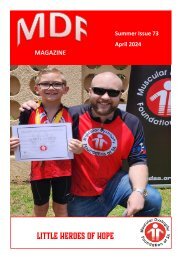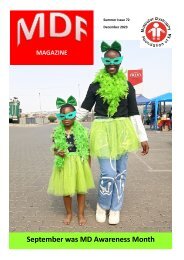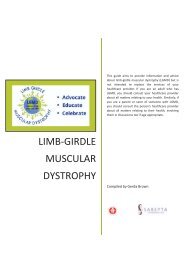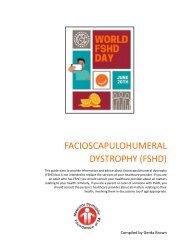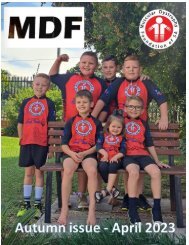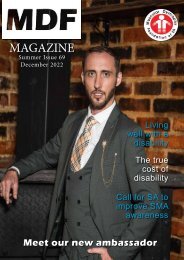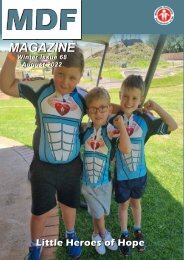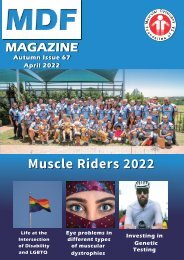MDF Magazine Issue 61 April 2020 (2)
Create successful ePaper yourself
Turn your PDF publications into a flip-book with our unique Google optimized e-Paper software.
Sandra’s thoughts on…
Social workers – valuable members
of the multidisciplinary team
By Sandra Bredell (MSW)
When you or a family member or friend receives a
diagnosis of muscular dystrophy or neuromuscular
dystrophy disorder, it can be utterly daunting and
overwhelming. This is not something you can or should
deal with on your own. Usually, a neuromuscular care
team will be part of your journey with this illness. A
social worker plays a very important part in that team
and a valuable part in the lives of those diagnosed with
the illness and their families. It is important to know that
you have someone to talk to who will deal with your
concerns in a confi dential and non-judgemental way.
Sarah Stoney is a social worker at the Children’s
Hospital of Philadelphia, and she describes her role as
follows:
As a social worker, I network with community
organizations and hospital resources to see how we
might best meet a families’ [sic] need ... I work to
help families with a variety of issues, including care
coordination, overcoming barriers to care, school
concerns, insurance issues, transition to adult
care, overall coping with diagnosis and disease
progression, community resourcing for families,
patient advocacy and end-of-life questions and
planning. (Muscular Dystrophy Association, ©2020)
Social workers in the fi eld of disability are trained to
assist with counselling but can also link the patient to
resources to address the practical aspects that the
patient is struggling with. The family and the patient
can also discuss issues related to equipment, housing,
education, transportation and home care with the social
worker. This helps to keep the multidisciplinary team
informed of the challenges you experience, so that
you can work together in fi nding the best solutions to
address the issues (Parent Project Muscular
Dystrophy, ©2020).
Assistance and guidance can also be provided by a
social worker to adjust to the diagnosis, to fi nd
services, to engage with schools and teachers regarding
modifi cations and assessing the local resources
(Parent Project Muscular Dystrophy, ©2020). Social
workers can provide information and guidance on how
to organise and manage your care plan following the
instructions of the medical experts (NYU Langone
Health, ©2020).
The following is also considered valuable input and can
be facilitated by social workers (Mah & Biggar, 2012):
• providing needed information for each family
• organising meetings with other patients or parents
of children diagnosed with the same muscular
dystrophy or related illness (family-to-family
support)
• coordinating networks and resources with the
patients and their families
• integrating the appropriate resources to the needs
of the different stages of phases of the illness
Emotional challenges can occur at any time during the
illness and should not be ignored. It is important to let
the social worker know if the patient or the patient’s
family experience any of these issues:
• fi nding it difficult to socialize with friends;
• experiencing a need to be isolated;
• feeling depressed;
• having trouble sleeping or skipping meals;
• problems with learning at school;
• tending to worry a lot or feeling anxious
continuously
• fi nding it difficult to manage anger;
• struggling to deal with sadness;
• fi nding social adjustment a challenge
42




